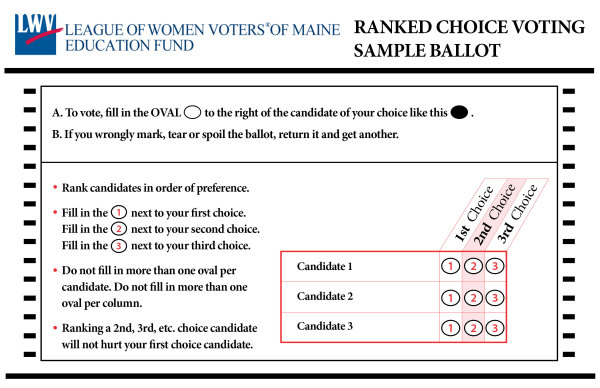Five States Vote for Democratic Reforms
Including ranked choice voting (Maine) and credit program to publicly finance candidates (South Dakota).
California
Voters here passed Prop 59, an advisory measure calling on elected officials to use their powers to help overturn Citizens United by an amendment to the U.S. Constitution, if needed, to allow full regulation of campaign spending and contributions and to proclaim that corporations do not have the same rights as persons. California became the 18th state to pass such a measure.
Maine
Voters here passed Question 5 in favor “ranked-choice voting,” also known as “instant-runoff voting.” This method allows you to rank the candidates in your order of preference. There are several rounds of voting. On the second round, the candidate with the least amount of votes is thrown out, and those who voted for that candidate as their number one get to have their vote for their number-two candidate counted next. This method proceeds until one candidate wins a majority. Maine is the first state in the Union that will use ranked-choice voting in elections for Congress, the state legislature, and the governorship.
Rhode Island
Voters here passed Question 2, which gave the Ethics Commission the authority to investigate and prosecute legislators.
South Dakota
Voters here passed Initiated Measure 22, which established a form of public financing called the South Dakota Democracy Credit Program. On even-numbered years, every registered voter is mailed two Democracy Credits, worth $50 each, which they can give to candidates participating in the public financing program.
The measure also reduced the amount that individuals can give to PACs and political parties from $10,000 down to $2,000.
On political ads, if there is coordination with other campaigns, the measure said such coordination must be disclosed.
It prohibited lobbyists from giving gifts to elected officials or staff that exceed $100 in any given year.
It also established a South Dakota Ethics Commission to prevent corruption and implement the Democracy Credit Program.
Washington
Voters here passed Initiative 735, which urges Washington’s Congressional representatives to pass an amendment to the U.S. Constitution to overturn Citizens United. That amendment would proclaim that rights listed in the Constitution are reserved for human beings, spending money is not the same as engaging in free speech, governments are empowered to regulate political contributions and expenditures to prevent corruption, and contributions and expenditures must be disclosed to the public. Washington became the 19th state to pass such a measure.
Matthew Rothschild is executive director of the Wisconsin Democracy Campaign.
Campaign Cash
-
Outside Groups Spent Record $28.8 Million on State Supreme Court Race
 May 7th, 2023 by Erik Gunn
May 7th, 2023 by Erik Gunn
-
Top 20 Donors to State Political Parties
 Apr 4th, 2023 by Peter Cameron and Hina Suzuki
Apr 4th, 2023 by Peter Cameron and Hina Suzuki
-
$38 Million Spent on High Court Race
 Mar 29th, 2023 by Erik Gunn
Mar 29th, 2023 by Erik Gunn























This is great! When liberals take away corporations’ First Amendment rights President Trump will be able to shut down MSNBC and the New York Times if they don’t report favorably on his presidency. Way to go!
Dean: Corporations aren’t people.
OMG, there is so much wrong with that sentence “[shutting] down MSNBC and the New York Times if they don’t report favorably on his presidency” is not respecting the first amendment.
You were being sarcastic / silly?
Sometimes it is useful to actually look at the text of the Constitution, Here is the First Amendment:
Congress shall make no law respecting an establishment of religion, or prohibiting the free exercise thereof; or abridging the freedom of speech, or of the press; or the right of the people peaceably to assemble, and to petition the Government for a redress of grievances.
The rights to peacably assemble and to petition the government are referred to as rights of “the people.” I think the best reading of these rights is that they do not apply to corporations or other entities.
Note that the provisions regarding religion, speech and the press are written as government prohibitions, not rights of the people. Fox News, MSNBC, Breitbart, Mother Jones, and the New York Times are all protected by the First Amendment from government control and censorship just as those of us posting here are. The First Amendment free speech provision in the Constitution does not contain an exception for corporations.
My statement about shutting down corporate news outlets was meant to show the idiocy of the position that First Amendment free speech rights do not apply to corporations.
:President Trump will be able to shut down MSNBC and the New York Times if they don’t report favorably on his presidency.”
Trump might do that anyway. Or try to.
Dean: Journalists ARE people.
You are correct happyjack27 and they can continue to write and publish on their own even if corporations have no First Amendment rights. However, if corporations have no First Amendment rights the government could prevent the New York Times, etc. from publishing the journalists’ work.
To Dean Lade: The framers of the Constitution and the First Amendment would never have contemplated that in the modern right wing dogma corporations would have risen to the status of person hood. Jefferson specifically said that vast concentrations of wealth represented a threat to our form of government. Justice Scalia, who claimed to be an “originalist” when confronted with this fact, said “modern corporations are different” They sure the hell are. They are much larger, led by the most greed driven and ruthless of the “next quarter is all, profit the only good” school of greed driven portfolio managers. Corporations are not people, they are a piece of paper filed with the government given their owners exemption from personal liability for the financial failures of the preemptively lawful business they are engaged in under their charter. Mr. Lade, I would hope that you and yours never have to be on the other side of one of these “corporate people” such as an insurance company or healthcare conglomerate. Your naive acceptance of this right wing talking point would be revisited rather quickly, I assure you.
Dean, do you think the newspapers had this kind of issue before the infamous mutilation of the 14th amendment that led to “Corporate Personhood” ?
Or do you think we had a free press back in the days of franklin and jefferson?
Sometimes it is useful to actually look at the text of the Constitution, Here is the First Amendment:
Congress shall make no law respecting an establishment of religion, or prohibiting the free exercise thereof; or abridging the freedom of speech, OR OF THE PRESS; or the right of the people peaceably to assemble, and to petition the Government for a redress of grievances. …
(emphasis added)